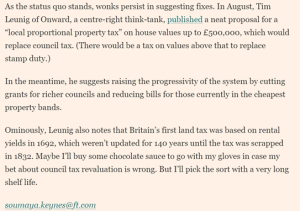The Financial Times article, “The Unfair Hole in Next Week’s UK Budget,” critiques the government’s reluctance to address Council Tax reform, despite mounting calls for an overhaul. As the Budget announcement nears, meaningful changes to Council Tax – a system untouched since property values were last set in 1991 – appear unlikely. Over the past 30 years, substantial shifts in house prices mean many homeowners are paying taxes that bear little relation to their property’s current value, underscoring the system’s outdated and inequitable nature.
Tim Leunig of the think tank Onward proposes a “local proportional property tax” as an alternative, taxing properties up to £500,000 at a local level and using higher tax brackets to replace Stamp Duty on more valuable properties. This approach seeks to create a fairer, more progressive tax structure. Additionally, Leunig suggests reducing grants to wealthier councils to ease the tax burden on properties with lower values. Fairer Share, a group advocating for equitable taxation, has funded this research and supports Leunig’s model as a pathway to a fairer system.
The article highlights why politicians hesitate to tackle Council Tax reform. Many residents are unclear about what Council Tax actually funds, and shifting the system risks backlash from those whose bills might increase. Reform would also necessitate rethinking central government’s funding of local councils—a task many prefer to avoid. With the Budget approaching, the article argues that Council Tax reform remains a “black hole” in policy, largely ignored despite expert calls for change. Although the Budget may include tax tweaks, meaningful Council Tax reform seems unlikely.
Read the article in full here.


